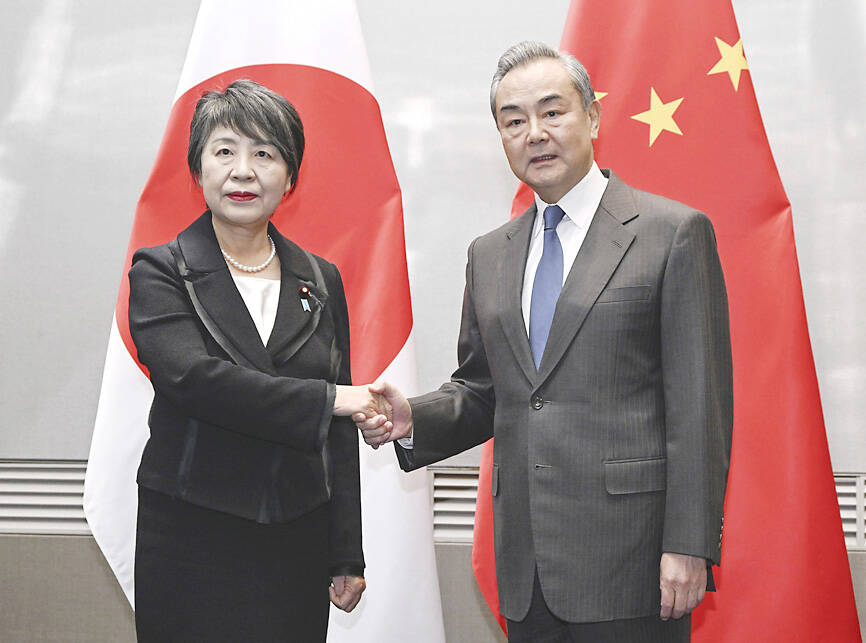Japanese Minister of Foreign Affairs Yoko Kamikawa and South Korean Minister of Foreign Affairs Park Jin underlined the importance of stability in the Taiwan Strait during separate meetings with Chinese Minister of Foreign Affairs Wang Yi (王毅).
Kamikawa and Wang met for about 100 minutes in Busan, South Korea, where they attended a trilateral summit over the weekend, the Japanese Ministry of Foreign Affairs said on Saturday.
Wang urged Japan to “keep its commitments” on the Taiwan issue — to “earnestly abide by the ‘one China’ principle” and refrain from interfering in China’s internal affairs, the Chinese Ministry of Foreign Affairs said in a news release.

Photo: Kyodo News via AP
Japan’s position on Taiwan remains unchanged, the Chinese news release said, while the Japanese statement said that Kamikawa stated the importance of cross-strait peace and stability.
Kamikawa expressed “serious concerns” about China’s increased military activities around Japan, her ministry said, adding that the two leaders agreed to hold a bilateral security dialogue as soon as possible.
Yesterday morning, Wang told Jin that the Taiwan issue is a “core interest” of China, the Central News Agency reported.
South Korea maintains its position of opposing use of force to change the “status quo” and emphasizing the importance of stability in the Taiwan Strait, it reported.
In Taipei, the Ministry of Foreign Affairs yesterday “sincerely welcomed and thanked” Kamikawa and Jin for supporting cross-strait peace and stability.
Japanese Prime Minister Fumio Kishida and South Korean President Yoon Suk-yeol, as well as other senior officials from both sides, have reiterated concerns and support for the cross-strait situation at international events, the ministry said, adding that Taiwan would continue working with them and other like-minded countries to safeguard a peaceful and open Indo-Pacific region.
In other developments, the US Navy asserted its navigational rights and freedoms in the South China Sea, and challenged restrictions on innocent passage imposed by Taiwan, China and Vietnam.
The recent activities of the US 7th Fleet’s USS Hopper in the South China Sea and near the Paracel Islands (Xisha Islands, 西沙群島) have angered Beijing, which sent naval and air forces to “track, monitor, warn and drive away” the US ship, Tian Junli (田軍里), spokesman for the Chinese People’s Liberation Army’s Southern Theater Command, said on Saturday.
Later on the same day, the 7th Fleet issued a statement saying that the destroyer “asserted navigational rights and freedoms” in the area, which is “consistent with international law.”
The operation “upheld the rights, freedoms, and lawful uses of the sea recognized in international law by challenging restrictions on innocent passage imposed by the People’s Republic of China, Taiwan, and Vietnam,” the statement said.
Claiming sovereignty over the Paracel Islands and asking permission to conduct innocent passage through their territorial sea contravenes international law, it said.

The CIA has a message for Chinese government officials worried about their place in Chinese President Xi Jinping’s (習近平) government: Come work with us. The agency released two Mandarin-language videos on social media on Thursday inviting disgruntled officials to contact the CIA. The recruitment videos posted on YouTube and X racked up more than 5 million views combined in their first day. The outreach comes as CIA Director John Ratcliffe has vowed to boost the agency’s use of intelligence from human sources and its focus on China, which has recently targeted US officials with its own espionage operations. The videos are “aimed at

STEADFAST FRIEND: The bills encourage increased Taiwan-US engagement and address China’s distortion of UN Resolution 2758 to isolate Taiwan internationally The Presidential Office yesterday thanked the US House of Representatives for unanimously passing two Taiwan-related bills highlighting its solid support for Taiwan’s democracy and global participation, and for deepening bilateral relations. One of the bills, the Taiwan Assurance Implementation Act, requires the US Department of State to periodically review its guidelines for engagement with Taiwan, and report to the US Congress on the guidelines and plans to lift self-imposed limitations on US-Taiwan engagement. The other bill is the Taiwan International Solidarity Act, which clarifies that UN Resolution 2758 does not address the issue of the representation of Taiwan or its people in

US Indo-Pacific Commander Admiral Samuel Paparo on Friday expressed concern over the rate at which China is diversifying its military exercises, the Financial Times (FT) reported on Saturday. “The rates of change on the depth and breadth of their exercises is the one non-linear effect that I’ve seen in the last year that wakes me up at night or keeps me up at night,” Paparo was quoted by FT as saying while attending the annual Sedona Forum at the McCain Institute in Arizona. Paparo also expressed concern over the speed with which China was expanding its military. While the US

SHIFT: Taiwan’s better-than-expected first-quarter GDP and signs of weakness in the US have driven global capital back to emerging markets, the central bank head said The central bank yesterday blamed market speculation for the steep rise in the local currency, and urged exporters and financial institutions to stay calm and stop panic sell-offs to avoid hurting their own profitability. The nation’s top monetary policymaker said that it would step in, if necessary, to maintain order and stability in the foreign exchange market. The remarks came as the NT dollar yesterday closed up NT$0.919 to NT$30.145 against the US dollar in Taipei trading, after rising as high as NT$29.59 in intraday trading. The local currency has surged 5.85 percent against the greenback over the past two sessions, central